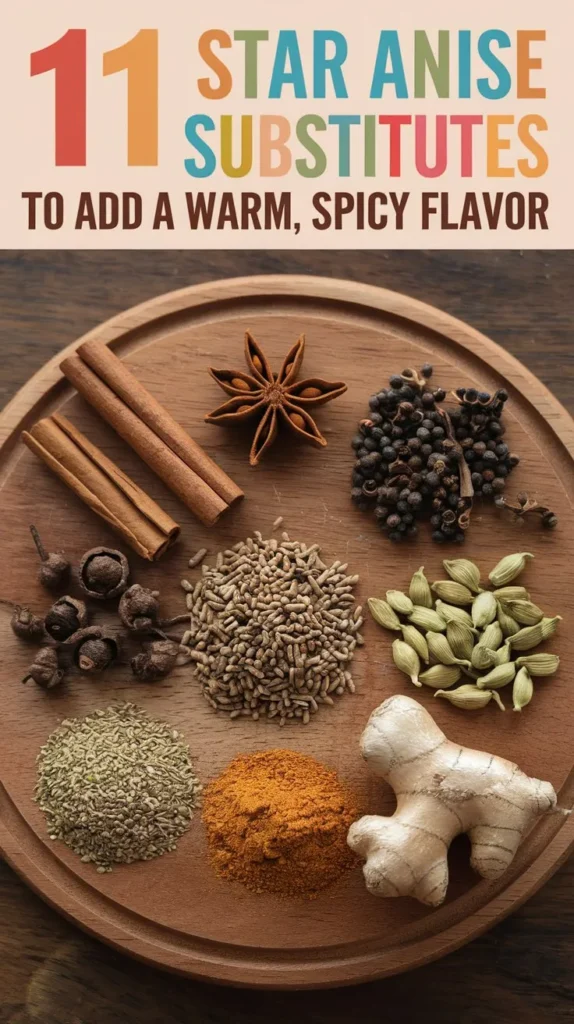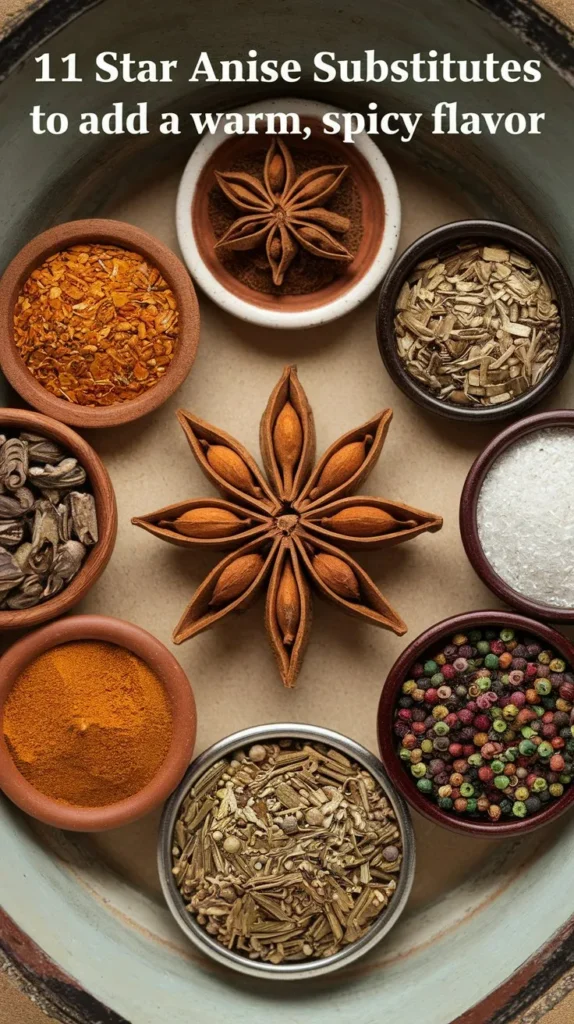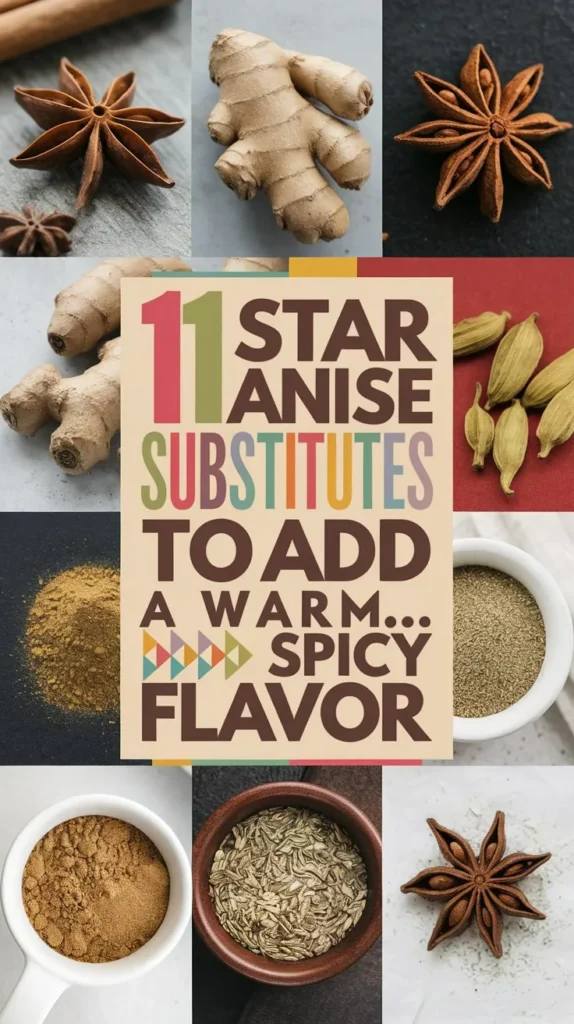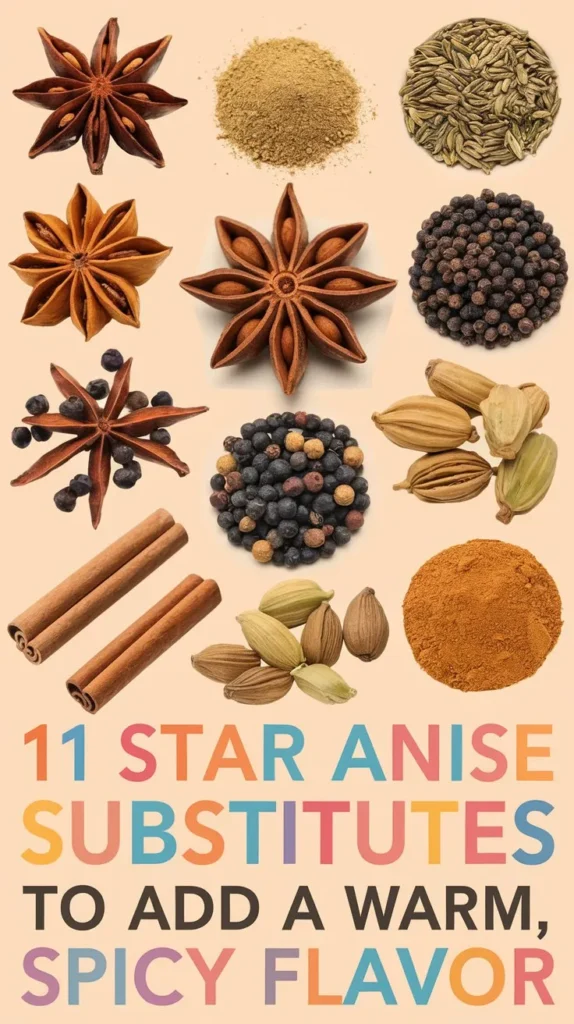11 Star Anise Substitutes to Add a Warm, Spicy Flavor
When you’re cooking up a dish that calls for star anise, but you don’t have any on hand, you’re not out of luck. You can easily swap it out for one of several alternatives that’ll add a similar warm, spicy flavor.
From sweet and aromatic options like fennel seeds and cinnamon sticks to pungent and spicy choices like ground cloves and smoked paprika, there’s a substitute that’ll fit the bill.
But which one is right for your recipe? You’ll want to explore these 11 options to find the perfect fit and take your dish to the next level.
At a Glance
- Fennel seeds offer a milder, sweeter flavor than star anise and can be used in baked goods, savory dishes, or as a digestive aid.
- Ground cloves release a warm, pungent flavor, making them a great substitute for star anise in many recipes, especially ground spice blends.
- Smoked paprika injects a savory, smoky flavor, adding a bold twist to recipes with its distinct smoked flavor profile.
- Cardamom pods have a complex aroma with hints of mint, eucalyptus, and lemon, making them a unique substitute for star anise in baked goods and desserts.
- Chinese Five-Spice Powder Blend combines cinnamon, cloves, fennel seeds, star anise, and Szechuan peppercorns, providing a versatile option for adding warm, spicy flavors.

Fennel Seeds: A Sweet Alternative
Several sweet and savory recipes rely on the distinct flavor of star anise, but when this spice is scarce, fennel seeds can save the day.
You might be surprised to learn that fennel seeds have been used for centuries, dating back to ancient Greece and Rome, where they were revered for their medicinal properties.
From a nutritional standpoint, fennel seeds are a powerhouse, packed with fiber, vitamins, and minerals. They’re also low in calories and rich in antioxidants, making them a guilt-free addition to your cooking.
When substituting fennel seeds for star anise, keep in mind that they’ve a milder, sweeter flavor. Use them in baked goods, savory dishes, or as a digestive aid after meals.
With their unique flavor and impressive nutritional profile, fennel seeds are an excellent alternative to star anise. Plus, they’re widely available and easy to incorporate into your cooking routine.
Chinese Five-Spice Powder Blend
As you explore the world of star anise substitutes, you’ll find that Chinese Five-Spice Powder Blend is another versatile option to add to your culinary arsenal.
This ancient blend has traveled along Chinese spice routes, accumulating a rich history and diverse flavor profile. Typically, it combines cinnamon, cloves, fennel seeds, star anise, and Szechuan peppercorns.
However, Five spice variations exist, and you can experiment with different proportions to create your signature flavor.
When using Chinese Five-Spice Powder Blend as a star anise substitute, start with a small amount, as its warm, spicy flavor can quickly overpower dishes.
Add it to braises, stews, or roasted meats for depth and complexity. You can also use it to season vegetables, soups, or stir-fries.
This blend is particularly well-suited for Asian-inspired cuisine, but feel free to experiment with it in other recipes.
With its complex, aromatic flavor, Chinese Five-Spice Powder Blend is sure to become a staple in your spice cabinet.
Ground Cloves: Pungent and Aromatic
Several whole cloves can be ground into a fine powder to create a potent substitute for star anise.
You’ll release a warm, pungent flavor that’s perfect for a variety of dishes. Ground cloves are a common addition to many ground spice blends, and their strong aroma makes them a great substitute for star anise in many recipes.
- Add depth to baked goods: Ground cloves pair well with cinnamon, nutmeg, and ginger to create a warm, aromatic flavor profile in cakes, cookies, and pies.
- Enhance savory dishes: Use ground cloves to add depth to stews, braises, and roasted meats, especially pork and beef.
- Create a unique rub: Mix ground cloves with other spices to create a unique rub for chicken, fish, or vegetables.
- Make a fragrant tea: Steep whole cloves in hot water to create a soothing, aromatic tea that’s perfect for cold winter nights.
Smoked Paprika: Savory and Smoky
While ground cloves bring warmth and depth to your dishes, smoked paprika injects a savory, smoky flavor that’s perfect for adding a bold twist to your recipes.
This vibrant red spice has a distinct smoked flavor profile that’s both earthy and slightly sweet.
When you incorporate smoked paprika into your cooking, you’ll notice a depth of flavor that’s hard to replicate with other spices.
It’s particularly well-suited for heartier dishes like stews, braises, and roasted meats, where its savory undertones can shine.
Smoked paprika’s smoky essence will transport you to the rustic kitchens of Spain, where it’s a staple in many traditional recipes.
It pairs beautifully with rich ingredients like chorizo, olives, and artichokes, and adds a surprising pop of flavor to vegetarian dishes like roasted eggplant and sweet potatoes.
With its bold, complex flavor, smoked paprika is an excellent addition to your spice rack, and a great substitute for star anise when you want to add a savory, smoky twist to your cooking.
Cinnamon Sticks: Warm and Inviting
Cinnamon sticks transport you to a cozy winter morning, their warm, inviting aroma wafting through the air like a comforting hug.
As you unwrap the bundle, the sweet, spicy scent fills your senses, making you feel like you’re part of a warm, fuzzy community. You can almost smell the cinnamon sugar cookies fresh from the oven, or the Cinnamon infused tea simmering on the stovetop.
When you’re looking for a substitute for star anise, cinnamon sticks are an excellent choice. Here’s why:
- Warm, inviting flavor: Cinnamon sticks add a comforting, sweet, and spicy flavor to your dishes, perfect for cold winter nights.
- Versatile: Use cinnamon sticks in both sweet and savory recipes, from baked goods to curries and stews.
- Easy to find: You can find cinnamon sticks in most grocery stores, making them a convenient substitute for star anise.
- Aromatic: The aroma of cinnamon sticks will transport you to a cozy winter morning, making your dishes feel more inviting and comforting.
With cinnamon sticks, you’ll feel like you’re wrapped in a warm, fuzzy blanket, surrounded by the people and things you love.
Nutmeg: Sweet and Slightly Bitter
Nutmeg: Sweet and Slightly Bitter
What’s the first thing that comes to mind when you crack open a nutmeg seed? The warm, aromatic scent that fills the air is unmistakable.
As a star anise substitute, nutmeg brings a unique flavor profile to your dishes. This sweet and slightly bitter spice is a staple in many cuisines, particularly in sweet and savory recipes.
Nutmeg benefits extend beyond its flavor. It has anti-inflammatory properties, can aid in digestion, and even help with pain relief.
When it comes to incorporating nutmeg into your cooking, the possibilities are endless. Add it to your favorite baked goods, like pies and cakes, or use it to spice up savory dishes like stews and soups.
You can even use nutmeg as a topping for oatmeal or yogurt. With a vast array of nutmeg recipes available, you’re sure to find a way to make this spice a staple in your kitchen.
Whether you’re looking to add warmth to your desserts or depth to your entrees, nutmeg is the perfect addition.
Cardamom Pods: Unique and Aromatic
As you hold a cardamom pod between your fingers, the papery, pale green husk cracks open, releasing an intense, sweet-savory aroma that’s both familiar and exotic.
The aroma is complex, with hints of mint, eucalyptus, and lemon, making it a unique substitute for star anise.
Cardamom flavor profiles are often described as sweet and spicy, with a hint of herbal undertones.
When used in cooking, cardamom adds depth and warmth to dishes, making it a popular choice for baked goods, desserts, and savory meals.
- Digestive aid: Cardamom has natural digestive properties that can help alleviate symptoms of indigestion and nausea.
- Antioxidant-rich: Cardamom is rich in antioxidants, which can help protect against cell damage and reduce inflammation.
- Anti-inflammatory: Cardamom has been shown to have anti-inflammatory properties, making it a natural remedy for pain relief.
- Oral health: Cardamom has been used for centuries to freshen breath and reduce plaque, making it a natural addition to oral care routines.
With its unique flavor profile and numerous health benefits, cardamom is an excellent substitute for star anise in many recipes.
Allspice Berries: Sweet and Spicy
You’ve likely encountered allspice berries in your favorite pumpkin pie recipe, but this warm, aromatic spice deserves more than a seasonal cameo.
Native to the Caribbean and Central America, allspice has a rich history dating back to the 16th century when it was traded as a valuable commodity. The spice is derived from the dried, unripe fruit of the Pimenta dioica tree, which is a member of the myrtle family.
Allspice varieties range from sweet and mild to strong and pungent, with some types exhibiting a more pronounced cinnamon or nutmeg flavor.
The most commonly used variety is Jamaican allspice, known for its sweet, warm flavor and aroma. Mexican allspice, on the other hand, has a more intense, peppery flavor.
When substituting allspice for star anise, use it sparingly, as its flavor can quickly overpower other spices. Start with a small amount and adjust to taste, as allspice can add depth and warmth to a variety of dishes, from baked goods to savory meats.
With its unique flavor profile and versatility, allspice is an excellent addition to your spice rack.
Ginger Powder: Spicy and Invigorating
With its fiery essence and pungent aroma, ginger powder adds a bold kick to a variety of dishes, from savory stir-fries to sweet baked treats.
You can use it to spice up your morning oatmeal or add depth to your favorite curry recipe. Ginger powder’s versatility is rooted in its rich history, dating back over 2,000 years to ancient China, where it was used for both culinary and medicinal purposes.
- Digestive aid: Ginger powder has natural anti-inflammatory properties that can help soothe digestive issues and reduce nausea.
- Immune system booster: Ginger contains compounds like gingerol and shogaol, which have antimicrobial properties that can help fight off infections.
- Pain relief: Ginger powder has been shown to reduce muscle and joint pain, making it a great addition to post-workout smoothies.
- Antioxidant-rich: Ginger powder is packed with antioxidants that can help protect your cells from damage caused by free radicals.
Caraway Seeds: Earthy and Nutty
Caraway seeds burst with an earthy, nutty flavor that instantly transports you to the rolling hills of Eastern Europe, where they’re a staple in traditional cuisine.
As you cook with caraway seeds, you’ll notice their earthy undertones and nutty flavors adding depth to your dishes. They’re a perfect substitute for star anise in many recipes, especially those with Middle Eastern or European roots.
You can use caraway seeds whole or ground, depending on your desired texture and flavor. Whole seeds add a pleasant crunch, while ground seeds release their flavors more quickly.
Try adding them to savory dishes like stews, soups, and braises, or use them to spice up your favorite bread recipe. Caraway seeds pair well with ingredients like onions, garlic, and coriander, so don’t be afraid to experiment with different combinations.
When substituting caraway seeds for star anise, keep in mind that they’ve a slightly more delicate flavor. Start with a smaller amount and adjust to taste, as their earthy, nutty flavor can quickly overpower other ingredients.
With a little practice, you’ll find that caraway seeds are a versatile and delicious addition to your spice cabinet.
Cassia Bark: Sweet and Cinnamon-like
As you venture beyond the earthy, nutty domain of caraway seeds, cassia bark beckons with its sweet, cinnamon-like aroma, instantly transporting you to the fragrant markets of Southeast Asia.
You’ll find yourself drawn to its warm, comforting flavor, reminiscent of baked goods and spiced treats.
Cassia bark benefits extend beyond its enticing aroma, as it’s rich in antioxidants and has natural anti-inflammatory properties.
When cooking with cassia bark, you can:
- Add it to your favorite baked goods, such as cinnamon rolls or sweet breads, for an extra boost of flavor.
- Use it to spice up your morning oatmeal or yogurt with a warm, comforting flavor.
- Incorporate it into your savory dishes, like stews or braises, for added depth and warmth.
- Make a delicious cassia bark tea by steeping the bark in hot water, perfect for a soothing evening drink.
Whether you’re looking to add a new dimension to your baking or seeking a comforting, spicy flavor, cassia bark recipes offer endless possibilities.
With its sweet, cinnamon-like aroma and numerous health benefits, cassia bark is an excellent addition to your spice cabinet.
FAQs
Can I Use Star Anise Substitutes in Baked Goods?
When baking, you can definitely experiment with star anise substitutes, but be mindful of the flavor profiles and spice levels you’re aiming for – some alternatives, like fennel or licorice, will add a distinct twist to your treats.
Do Star Anise Substitutes Have Similar Health Benefits?
You’ll be thrilled to know that many star anise substitutes retain similar health benefits, thanks to their anise compounds! Like herbal remedies, they can soothe digestive issues, reduce inflammation, and even exhibit antimicrobial properties, making them a wonderful addition to your wellness routine.
Can I Mix and Match Different Star Anise Substitutes?
You’re curious if you can mix and match different star anise substitutes, and the answer is yes! You can blend unique flavor profiles to create custom spice blends, crafting a signature taste that’s all yours, with warm, spicy, and aromatic notes that tantalize your senses.
Are Star Anise Substitutes More Expensive Than Star Anise?
You’re wondering if star anise substitutes will break the bank, right? Generally, they’re pricier than whole star anise, especially if you’re looking for high-quality alternatives that pack a similar flavor punch, which can be a challenge when working within budget constraints.
Can I Grow My Own Star Anise Substitute Plants at Home?
You can grow your own star anise substitute plants at home, starting with careful seed selection and meticulous soil preparation, creating a haven for your chosen herbs to thrive, and welcoming the warm, spicy flavors into your kitchen.










DK Jacks is a passionate food enthusiast, recipe developer, and culinary explorer. With a love for both traditional and innovative flavors, DK brings a fresh perspective to the kitchen. When not experimenting with new ingredients, you’ll find DK capturing food moments through the lens or sharing cooking tips with fellow foodies.🍽️📸✨






